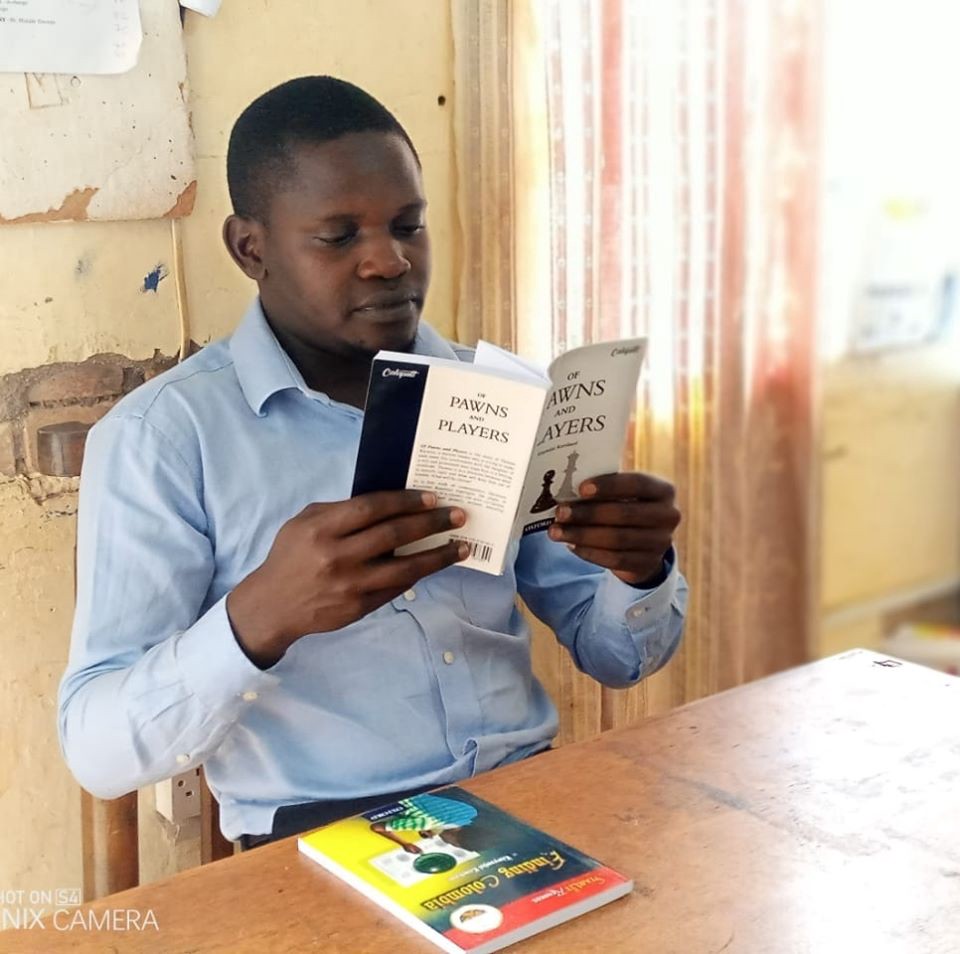The title”Of Pawns and Players” is allusive to Chess game. Chess is a two-player strategy game played on a checkered board with 64 equal squares arranged in an 8×8 grid. The squares are arranged in two alternating colors, white and black.
Chess pieces are of contrasting colours, commonly white and black. The six different types of pieces are: king, rook, bishop, queen, knight, and pawn. Pawn is the least important piece (though this may be disputed). In this text, Tom is used as a pawn to make money for the filthy rich corporate oligarchs such as the minister and his ilk as only a paltry sum of the money is given to the pawn whereas most of it is enjoyed by the oligarchy.
The cover page of the text has a pawn in the foreground which is distinct and easily visible and a King that is faded in the background. Notice my choice of punctuation for the two pieces. The pawn here a representative of the poverty-stricken who are lured into the “business” whereas the King is representative of the affluent, the opulent, and the moneyed who reap from the poor. The players could well be the oligarchs, the wealthy shareholders, and the intermediaries such as journalists who are used to further bait the unsuspecting destitute.
Kinyanjui Kombani’s “Of Pawns and Players” is a masterpiece that explores the serious problem of betting in a laughing manner.The plot twist is employed through and through and if the book were written in Kiswahili it would probably have earned the title “Pwagu apata Pwaguzi” given the nature of tricks and counter tricks. The author should consider a translation of the same in Kiswahili.
Weaved in a first person point of view which fits well in the story as it entails narration of “our boy” Tom’s experiences from his mutura adventures, to being caught in a pseudo-love triangle pitying him against Danny and Alphonse in their quest to win Aria, a flawlessly beautiful and cunning daughter of a pseudo-billionaire, Mr Walaki. And the betting syndicate, which is a kin to trickster narratives, pitying the mighty against the weak, endowed with sharp wits- sharper than a razor blade.
Blended with local dialect, slangs and popular phrases such as utajua hujui are aptly employed by means of the author’s unmatched linguistic dexterity while at the same time using simplistic language that resonates with Mutura Man, “Of Pawns and Players” version of ‘mama mboga’ or what we call ‘Wanjiku’ in political cycles and activism, AKA common man or hollo polloi.
The story though fictional gives a glimpse of what transpires in the dark world of betting. The masterminds are often detached from the real developments on the ground while sticking at a higher level where profits are shared and pawns lured. Their targets are often if not almost always the penniless, the beggarly or the pauperized as seen in the case of Tom.
The portraiture of Tom as a would-be millionaire is necessary. One because the poor are the targets as they do not have the riches and are therefore susceptible to ‘get-rich-quick” schemes. The second reason is the poor lack financial education as opined by Robert Kiyosaki in his book “Rich Dad Poor Dad”.
There’s a proverb in Lunje, Imbwa ilondanga khusokonyala khwa ng’ina, the dog follows the squatting of its mother (Or parent). This gives us a hint that children learn from their parents, just as Helmer argues about the influence of a parent on their children in Henrik Ibsen’s”A Doll’s House”. Aria is unfeeling and indifferent regarding the plight of those who succumb to negative effects of betting. And although she originally comes up with the idea of recompensing the affected families, much later we realize that was just a ploy to hoodwink Tom into abandoning the firm’s offer.
In the end, Tom with the help of Elisha manages to outwit the betting oligarchs including Aria who is an extension of the cartels. The book however fails to punish Tom and Elisha for indulging in betting, for although Elisha’s family suffers for lack of basics as his finances are diverted in the end the two enjoy the loot in a Tanzanian Island of Zanzibar besides donations made.
The book tackles a strong theme of Greed in our society and the betting metamorphosed in it. I recommend it for teenage and adult readers. It is titillating, scintillating, and riveting. Grab your copy and make your assessment of it.





